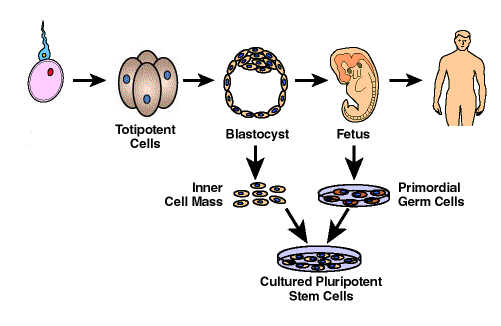Obtaining stem cells
How are stems cells obtained?
In order for stem cells to be cultivated, the pluripotent
cells have to be alive. It must have the potential to
be multiplied. The source of the cell must also be alive.
This is therefore, very difficult to obtain suitable
pluripotent cells.
Four Ways to Obtain Embryos
Fertility Clinics

During in-vitro fertilization, clinics routinely
fuse more than one egg with sperm. That way, if
implanting a fertilized egg doesn't work the first
time, they can try again.
This practice has left
thousands of unwanted embryos stored in clinic freezers.
James Thomson, the first scientist to establish
a human stem-cell line, used such embryos. (See
diagram on the right)
Aborted Fetuses
John Gearhart, the Johns Hopkins biologist credited,
along with Thomson, with first culturing stem cells,
extracted his from fetuses donated by women at a
nearby abortion clinic. (see diagram on the right)
Cloning
Advanced Cell Technology of Worcester, Mass., acknowledged
last week that it is trying to create cloned human
embryos as sources for stem cells. The company has
considered selling its stem cells to other researchers.
Made to Order
The Jones Institute in Virginia, where the first
U.S. test-tube baby was conceived, has mixed sperm
and eggs expressly to create embryos as sources
for stem cells.
Although all the methods are very different in sources,
the cells cultivated turn out to be very similar. Another
way of obtaining stem cells is from the use of somatic
cell nuclear transfer (SCNT). This method is being testing
currently on animals. This method fuses cells together,
using the nutrients of eggs.
Adapted from: http://www.ncbi.nlm.nih.gov/About/primer/genetics_cell.html
|

